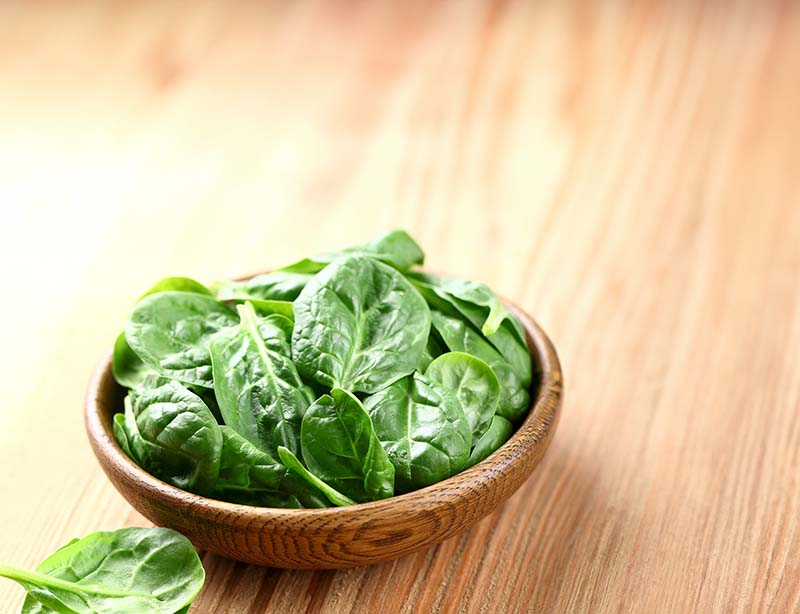Achieving a healthy body and an ideal weight is a common aspiration, often prompting questions like “Does Spinach Help You Lose Weight?” Among the various dietary strategies, incorporating vegetables, including water spinach, is a popular choice.
Water spinach, distinct from common spinach, is often considered in weight loss diets due to its nutritional profile. This article explores water spinach’s role in weight loss, known for its low calorie and high fiber content, and its potential to assist in weight management.
Read more
- Does Broccoli Help You Lose Weight? The Secret Revealed.
- Is Bok Choy Good for Weight Loss? Insights into Its Health Advantages.
- Are Bell Peppers Good for Weight Loss? Discover the Secret!.
Is Spinach Good for Weight Loss?
Spinach is an incredibly beneficial addition to any weight loss journey. This leafy green is not only low in calories, but it’s also packed with fiber. This combination is ideal for anyone looking to manage their weight effectively. The high fiber content in spinach plays a crucial role in making you feel full and satiated, reducing the urge for unnecessary snacking. By including spinach in your balanced diet, you’re making a smart and healthy choice towards achieving your weight loss objectives.
Note: For an added boost, try incorporating spinach into smoothies or salads. It’s a versatile vegetable that can enhance the nutritional value of various meals without adding extra calories.

Nutritional Value of Spinach
Spinach, in a mere 3.5 ounces (100 grams), offers a surprisingly low calorie count of just 23 calories. It’s composed of 91% water, making it incredibly hydrating. The protein content stands at 2.9 grams, accompanied by 3.6 grams of carbs and a minimal 0.4 grams of sugar. Notably, it provides a substantial 2.2 grams of fiber and just 0.4 grams of fat.
The carbohydrate profile of spinach is predominantly fiber, renowned for its health benefits. Alongside fiber, spinach contains small quantities of natural sugars, mainly glucose and fructose.
The fiber in spinach is largely insoluble, which plays a pivotal role in digestive health. It adds bulk to the digestive system, aiding in smoother passage and preventing constipation, thereby promoting overall gut health.
Weight Loss Benefits of Spinach
Spinach stands out as a remarkable vegetable for those on a weight loss journey, offering several advantages:
Rich in Nutrients
Spinach is a powerhouse of nutrition, packed with essential vitamins and minerals while being low in calories. It’s an excellent source of vitamins A, C, E, and K, and is rich in iron, calcium, and potassium. These nutrients not only support overall health but also aid in weight loss efforts.
Low Calorie Content
With only 7 calories per cup when cooked, spinach is an excellent food for weight loss diets. It adds volume and nutrients to your meals without contributing excess calories, making it perfect for calorie-conscious eating.
Rich in Fiber and Hydration
Spinach offers a high fiber content, about 4 grams per cup when cooked, which is great for digestion and maintaining a feeling of fullness. This can be particularly beneficial in controlling hunger and supporting weight management. Additionally, its high water content (91%) aids in hydration and further enhances the feeling of fullness.
Convenient When Preparing
Incorporating spinach into your diet is effortless. It’s a versatile ingredient that can be added to smoothies, salads, soups, and stir-fries. It can also serve as a base in dishes like spinach and feta stuffed chicken breast or spinach and mushroom quiche. This ease of inclusion makes spinach a convenient choice for preparing healthy, weight-loss-friendly meals.
Note: To leverage the weight loss benefits of spinach, consider its role in meal planning. Its low-calorie yet nutrient-rich profile makes it an ideal ingredient to bulk up meals without adding unnecessary calories, helping in managing portion sizes and reducing overall calorie intake.
15 Health Advantages of Spinach
Spinach, often hailed as a superfood, offers a plethora of health benefits that contribute to overall wellness, from improving eyesight and cancer prevention to regulating blood sugar. Here’s a closer look at the myriad health advantages of this leafy green:
Prevent Acne
Spinach can help alleviate skin inflammation and reduce acne. A homemade facial mask using spinach paste can combat skin inflammation, remove dirt, and control excess oil.

Lower Blood Pressure
Rich in vitamin C, spinach aids in reducing hypertension, a key factor in heart diseases, kidney disease, and strokes. Regular consumption can also lower anxiety and stress.

Improve Bone Health
The vitamin K in spinach supports strong bones and enhances calcium absorption, critical for bone and dental health.

Improve Eye Health
Antioxidants like lutein and zeaxanthin in spinach protect against cataracts and age-related macular degeneration. Vitamin A in spinach also maintains healthy mucus membranes for good eyesight.

Maintain Normal Brain Function
Regular spinach intake supports brain function, especially in older age, due to its vitamin K content, which is essential for a healthy nervous system.

Prevent Cancer
Spinach’s high levels of zeaxanthin and carotenoids help eliminate free radicals, reducing cancer risks.

Natural Anti-aging Properties
The antioxidants in spinach combat free radicals responsible for premature aging, promoting youthful, radiant skin.
Promotes Relaxation in the Body
High in zinc and magnesium, spinach contributes to better sleep and stress management.

Facilitates Weight Loss
Low in calories and high in fiber, spinach aids in digestion, regulates blood sugar, and helps in weight management.

Strengthens the Immune System
Vitamin A in spinach strengthens the body’s entry points, like respiratory and intestinal tracts, boosting overall health and energy.
Prevent Heart Attack and Atherosclerosis
Lutein in spinach prevents artery thickening, reducing the risk of heart disease and atherosclerosis.
Prevents Anemia
The iron content in spinach is beneficial in preventing anemia and is particularly important for women, children, and adults requiring increased iron intake.
Helps Brighten Skin
Vital nutrients in spinach, such as vitamins A, C, E, and K, contribute to healthy, glowing skin.
Reduce Blood Sugar
The potassium in spinach is effective in counteracting the effects of sodium, beneficial for those with high blood pressure.

Helps Fight Inflammation
Spinach’s anti-inflammatory properties, including neoxanthin and violaxanthin, are effective against conditions like osteoporosis, migraines, asthma, arthritis, and headaches.
Exploring Spinach’s Potential Benefits
Spinach and Its Health Benefits Across Different Age Groups
For Men’s Health
Spinach is a nutritional powerhouse for men, enriched with essential vitamins A, C, and K, along with minerals like iron and magnesium. These nutrients are pivotal for enhancing energy levels, improving muscle function, and promoting cardiovascular health. Folate in spinach plays a crucial role in reproductive health and fertility. Additionally, the antioxidants present in spinach aid in combating oxidative stress, thereby potentially reducing the risk of chronic diseases common in men, such as heart issues and prostate problems. Regular inclusion of spinach in the diet can significantly support men’s health.
For Women’s Health
The wealth of nutrients in spinach, including iron, calcium, and folate, makes it particularly beneficial for women. These elements are essential for maintaining strong bones, preventing anemia, and are vital during pregnancy. Spinach’s antioxidants, like vitamins C and E, help in protecting against aging and reducing the risk of chronic diseases. Its fiber content is also beneficial for digestive health and weight management, which are key components of women’s health. Thus, adding spinach to their diet is a wise choice for women aiming to enhance their health.
For Your Baby’s Health
Introducing spinach into a baby’s diet can be highly beneficial. It’s packed with crucial nutrients like iron, calcium, and vitamins A and C, which are fundamental for a baby’s growth and development. The iron in spinach helps prevent anemia, while calcium is important for bone health. Antioxidants like vitamin A support the immune system and are important for vision development. However, it’s important to prepare spinach correctly for babies – cooked and pureed to ensure safety and digestibility. Consulting with a pediatrician is recommended before introducing spinach to a baby’s diet to confirm its suitability for the child’s age and developmental stage.
Potential Downsides of Spinach
While spinach is widely recognized for its health benefits, certain conditions warrant caution in its consumption:
- Kidney Stones: One of the common causes of kidney stones is the buildup of acid and mineral salts, with calcium oxalate stones being the most prevalent type. Given that spinach is rich in both calcium and oxalates, individuals who are predisposed to kidney stones may need to moderate their spinach intake. This is crucial because the high levels of these substances in spinach can potentially contribute to the formation of these stones.
- Blood Clotting: Spinach is a significant source of vitamin K1, known primarily for its role in blood clotting. This characteristic means that spinach can interact with blood-thinning medications, such as warfarin. The vitamin K1 in spinach can counteract the effects of these medications, potentially leading to complications. Therefore, it’s essential for individuals on blood thinners to consult their healthcare provider before incorporating large quantities of spinach into their diet.
Is It Good to Eat Spinach Every Day to Lose Weight?
Incorporating spinach into your daily diet can be highly beneficial for weight loss. This leafy green is a weight management ally, thanks to its low calorie and high fiber content. These characteristics make spinach an excellent food for those looking to shed some pounds, as it helps you feel fuller for longer, thereby aiding in reducing overall calorie intake.
Adding spinach to your diet is not just nutritious but also versatile. You can enjoy it in numerous forms, such as a fresh spinach salad, a rejuvenating spinach juice, a nutrient-packed spinach smoothie, a flavorful spinach paratha, and many other dishes. This variety ensures that your diet remains interesting and enjoyable while you reap the benefits of this nutrient-rich vegetable.

How Much Spinach Should You Eat a Day?
Moderation is key, even with nutrient-rich foods like spinach. Nutritionists generally recommend consuming up to 2 cups of spinach per day. This amount allows you to benefit from its rich nutrient profile, including vitamins, minerals, and fiber, without overdoing it.
Exceeding this recommended daily intake over an extended period could potentially lead to health complications. This is particularly relevant due to the high levels of oxalates in spinach, which, in excessive amounts, can contribute to the formation of kidney stones, as well as its high vitamin K content, which could interfere with certain medications.
Conclusion
To conclude, addressing “Does Spinach Help You Lose Weight?” highlights spinach’s importance in weight loss. Its low-calorie, high-fiber properties make it a great choice for those seeking a healthier lifestyle.
We hope this blog has provided insight into incorporating spinach in your weight loss journey and encourage you to share your experiences with spinach for weight loss. Don’t forget to check out more informative and engaging blogs from Sure Life Health for more health tips and insights.
Professor Gaye Cunnane, PhD, MB, FRCPI
As the Director of Health and Wellbeing at RCPI, Professor Gaye Cunnane is at the helm of initiatives aimed at enhancing the health and well-being of RCPI Trainers and Trainees. Her role extends beyond administration; she is also a respected clinical professor of rheumatology and a consultant rheumatologist at Trinity College Dublin (TCD) and St James’s Hospital. Prof. Cunnane’s medical journey began at TCD, where she graduated from medical school, and her path has been marked by both clinical and academic excellence.
After completing her basic clinical training in medicine, she embarked on PhD studies at University College Dublin and St Vincent’s University Hospital. Her research during this period was focused on prognostic markers in early inflammatory arthritis, a project that saw her collaborating with esteemed universities across Europe, including in Switzerland, The Netherlands, the UK, and Sweden.
Prof. Cunnane’s career took her to the University of California, San Francisco, where she spent three years delving into research on new treatments for lupus. Her academic prowess led her to the University of Leeds in 2001 as a senior lecturer, before returning to Ireland in 2003 to assume her current roles. She has also served as the National Specialty Director for Rheumatology training in Ireland, Programme Director for Basic Specialist Training with RCPI, and as a past President of the Irish Society for Rheumatology.
PUBLISHED ARTICLES
“Rheumatic disease differentiation using immunoglobulin G sugar printing by high-density electrophoresis”: Published in The Journal of Rheumatology, this study reflects her in-depth investigation into rheumatic diseases.
“Benefits of exercise in patients with rheumatoid arthritis: a randomized controlled trial”: This research work, highlighting the positive impact of exercise on rheumatoid arthritis, underscores Prof. Cunnane’s dedication to practical, patient-centered research.
Additionally, Prof. Cunnane has made notable contributions to the Annals of the Rheumatic Diseases, discussing early referral, diagnosis, and treatment of rheumatoid arthritis. She has also been involved in a study on the NCBI platform investigating exercise benefits in rheumatoid arthritis patients.
Professor Gaye Cunnane’s career is a testament to her commitment to improving patient outcomes in rheumatology through rigorous research, clinical excellence, and dedicated teaching. Her work continues to influence the field of rheumatology, both in Ireland and internationally.

